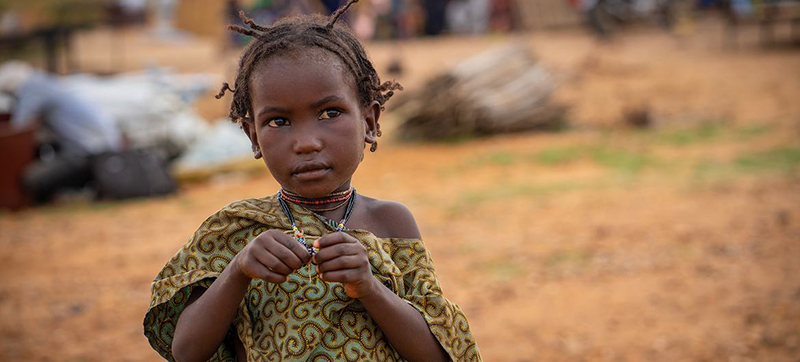Central Sahel: Lives of 10 million children on the line as conflict rages

New York: Children are increasingly caught up in armed conflict in the climate-affected, food insecure central Sahel region, the UN Children’s Fund (UNICEF) said on Friday.
“Brutal” armed conflict has left 10 million children in Burkina Faso, Mali and Niger in need of humanitarian assistance – more than double the number in 2020, UNICEF warned in a new report.
And hostilities spilling over into neighbouring countries, are putting an extra four million children at risk.
“The conflict may not have clear boundaries, there may not be headline-grabbing battles, but slowly and surely things have been getting worse for children, and millions of them are now caught up in the centre of this crisis,” said UNICEF spokesperson John James.
Children living on the frontlines of hostilities between armed groups and national security forces are increasingly in the line of fire, too.
In Burkina Faso, for instance, the number of children killed during the first nine months of 2022 tripled compared to the same period in 2021. Children are also being recruited by armed groups and forced to fight or support militants in backup role, UNICEF said.
School attacks
In addition, armed groups in Burkina Faso, Mali and Niger have been directly targeting schools, in an “accelerating attack on education”. According to the UNICEF report, more than a fifth of schools in Burkina Faso have closed as a result of attacks.
“More than 8,300 schools in those three countries – Mali, Burkina Faso and Niger – are now closed due to violence and insecurity”, said Mr. James. That’s teachers who fled the schools, children who are too scared to go to the schools, families who are displaced - that’s buildings that have been attacked and caught up in the violence”, UNICEF’s Mr. James told journalists in Geneva.
Spillover effect
Hostilities have already spilled over from the central Sahel into the northern border regions of Benin, Cote d’Ivoire, Ghana and Togo where, UNICEF notes, “children have extremely limited access to essential services and protection”.
At least 172 violent incidents, including attacks by armed groups, were reported in the northern border areas of the four countries in 2022.
Climate crisis and food insecurity
UNICEF explained that the central Sahel suffers from severe food and water scarcity, and that armed groups make survival for civilians even harder by blockading towns and villages and contaminating water points.
Fifty-eight water points were attacked in Burkina Faso alone in 2022, close to a threefold increase from the previous year.
Overall, more than 20,000 people in the border area between Burkina Faso, Mali and Niger face ‘catastrophe-level’ food insecurity by June 2023, according to humanitarian assessments.
Climate change shocks
Climate shocks are a key factor affecting crops, with temperatures in the Sahel rising “1.5 times faster than the global average”, and “erratic” rainfall which leads to flooding, UNICEF said.
The impacts of extreme weather events are an important driver of displacement, with over 2.7 million displaced across the three countries.
The crisis in the Sahel is increasingly mirrored globally: in 2022, over 8,000 children worldwide were killed and maimed by armed forces and groups, more than 7,000 children recruited and over 4,000 abducted, the Special Representative of the Secretary-General for Children and Armed Conflict, Virginia Gamba, told the Human Rights Council on Thursday.
Chronic underfunding
The UN Children’s Fund underscored that the crisis in the central Sahel remains “chronically and critically underfunded”, with only one third of the required funding received by UNICEF in 2022.
This year, the UN agency has appealed for $473.8 million to support its humanitarian response in the central Sahel and in neighbouring coastal countries.
UNICEF has also called for “long-term flexible investment” in essential social services, and stressed the need to work with communities and young people in the region to ensure a better future for them.



